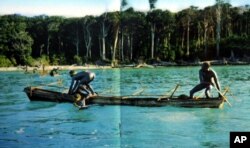Police in India have put on hold efforts to retrieve the body of an American missionary who was presumably killed by a secluded tribe on an island off the Indian mainland.
The move came after anthropologists, researchers and an international rights group had urged authorities to call off the search, saying it posed a risk to the hunter-gatherer tribe.
John Allen Chau went to the prohibited North Sentinel Island on a mission to convert the tribe to Christianity. Tribe members reportedly shot him dead with arrows. Fishermen said they spotted tribe members dragging and burying the body in the sand.
Since then, police grappled with the challenge of recovering the 27-year-old’s body from an island that has been off limits for centuries and whose inhabitants have defied all attempts by outsiders for contact.
The latest attempt to get close to the island was abandoned Saturday after police, who had stopped their boat about 400 meters from the shore, spotted the Sentinelese standing armed with bows and arrows.
In a statement, Survivor International called the search “incredibly dangerous” for both the tribe and officials, and said, “Mr Chau’s body should be left alone, as should the Sentinelese.”
"Such efforts in similar cases in the past have ended with the Sentinelese attempting to defend their island by force," said Survival director Stephen Corry. The group, which campaigns to protect threatened tribes, also stressed the risk of exposure to outside diseases for the tribe with every contact. Isolation from the outside world is considered essential to their survival as they have no immunity to modern-day diseases.
‘Incursions’ unwelcome
A group of anthropologists, researchers and authors has also expressed concern that attempts to retrieve the body could escalate tensions as the tribe clearly finds these “incursions” unwelcome.
“Continuing with the efforts could well lead to further violence and completely unwarranted loss of life,” they said in a joint statement. “The rights and the desires of the Sentinelese need to be respected.”
One of the signatories, anthropologist Visvajit Pandya, told VOA “When we have a rule that nobody should go to the island, why should we pursue efforts to get the body?”
Going to the island, which is part of India’s Andaman and Nicobar archipelago, is illegal and all efforts to study the Sentinelese have been made from a distance.
The police chief of the Andaman and Nicobar, Dependra Pathak, has called the case the “most challenging ever.” The police also said that it is taking care to ensure that this “particularly vulnerable tribal group” is not disturbed or distressed.
The tribe, estimated to number about 50 to 150 people, has fended off all efforts by anthropologists and others to get close to them.
Chau went to the island in mid-November after paying fishermen to take him there. Despite being shot at with arrows, he returned there the next day.










